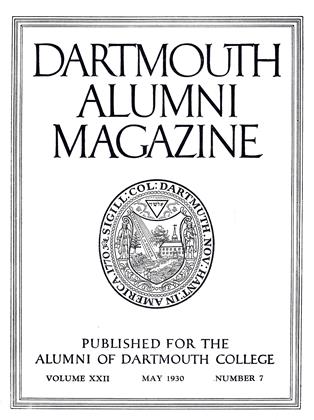Albert H. Washburn, distinguished diplomat who died in Vienna April 2, soon after his resignation as United States Minister to Austria, remained at the time of his death a Dartmouth professor on leave of absence from the College. When he left Dartmouth on being appointed to a diplomatic post, Professor Washburn expressed his desire to return to his position at Dartmouth and to his home in Hanover after he had spent a period in the diplomatic service and accomplished certain aims there. He was consequently granted technical leave of absence by the College, and had since frequently reaffirmed his desire to return to his teaching duties here.
The fact that Mr. Washburn became increasingly valuable to the Department of State has operated to postpone his return to his professorial post at Dartmouth, and the day following his death President Hoover announced that Minister Washburn had been chosen as the next ambassador to Japan. This appointment might have further delayed Mr. Washburn's return to Dartmouth, had he lived, although he had recently intimated to College officials that he would be glad to close his diplomatic career and return to Dartmouth.
Appointed to the Vienna post by President Harding, he had been asked to remain by President Coolidge and President Hoover, Very popular with Austrians, he received great tributes from the Austrian press at the time of his resignation and when he became seriously ill with erysipelas the Austrian churches offered prayers for his recovery. In an editorial concerning his death, TheDartmouth commented on the illusion sometimes found among undergraduates that professors teach because they cannot do anything else, and said:
"The most tremendous bomb-shell for this particular illusion is to be found in the life of Dr. Albert Washburn, who died in Vienna a few days ago. Dr. Washburn had been Professor of Political Science and International Law at Dartmouth since 1919. He graduated from Cornell and studied law at the University of Virginia and at Georgetown. In 1890 he was given his first diplomatic assignment as United States Consul at Magdeburg, Germany. He next became the private secretary of Senator Henry Cabot Lodge. From 1897 to 1901 he served as a special United States Treasury Consul in custom cases. President Harding appointed him Envoy Extraordinary and Minister Plenipotentiary to Austria in 1922 and he was given leave of absence from his duties as professor at Dartmouth. Although he tendered his resignation to President Coolidge, he was requested to remain in the post, and he stayed for nearly a year during President Hoover's administration. In January he was succeeded by Gilchrist Stockton. While in Vienna closing affairs, he died of erysipelas. The day after his death it was announced from the White House that President Hoover had just selected him as next ambassador to Japan.
"He was a leadingauthorityoninternational law. He was the second delegate on the Commission of Jurists at the Hague to consider an amendment of the laws of war in consequence of a resolution adopted at the Washington Arms Conference. Norway conferred on him the title of chevalier, first class, Royal Order of Saint Olav. He was the president of a commission to adjust differences arising from provisional commercial agreements between Austria and Jugoslavia. "He was a professor at Dartmouth."
RICHARD C. CAMPBELL '86 Who died in Denver recently, leaving the College an unrestricted bequest of $100,000. (See Necrology.)
 View Full Issue
View Full Issue
More From This Issue
-
 Class Notes
Class NotesCLASS OF 1923
May 1930 By Truman T. Metzel -
 Article
ArticleSome Memorable Teachers
May 1930 By Professor E. J. Bartlett -
 Lettter from the Editor
Lettter from the EditorEditorial Comment
May 1930 -
 Class Notes
Class NotesCLASS OF 1909
May 1930 By Robert J. Holmes -
 Sports
SportsFootball at Dartmouth Since the War
May 1930 By Professor J. P. Richardson -
 Books
BooksECONOMICS
May 1930







